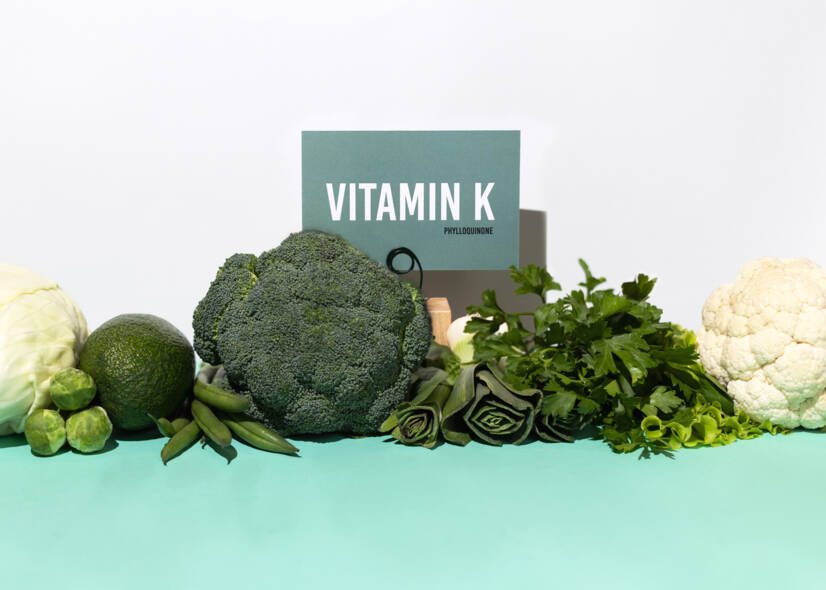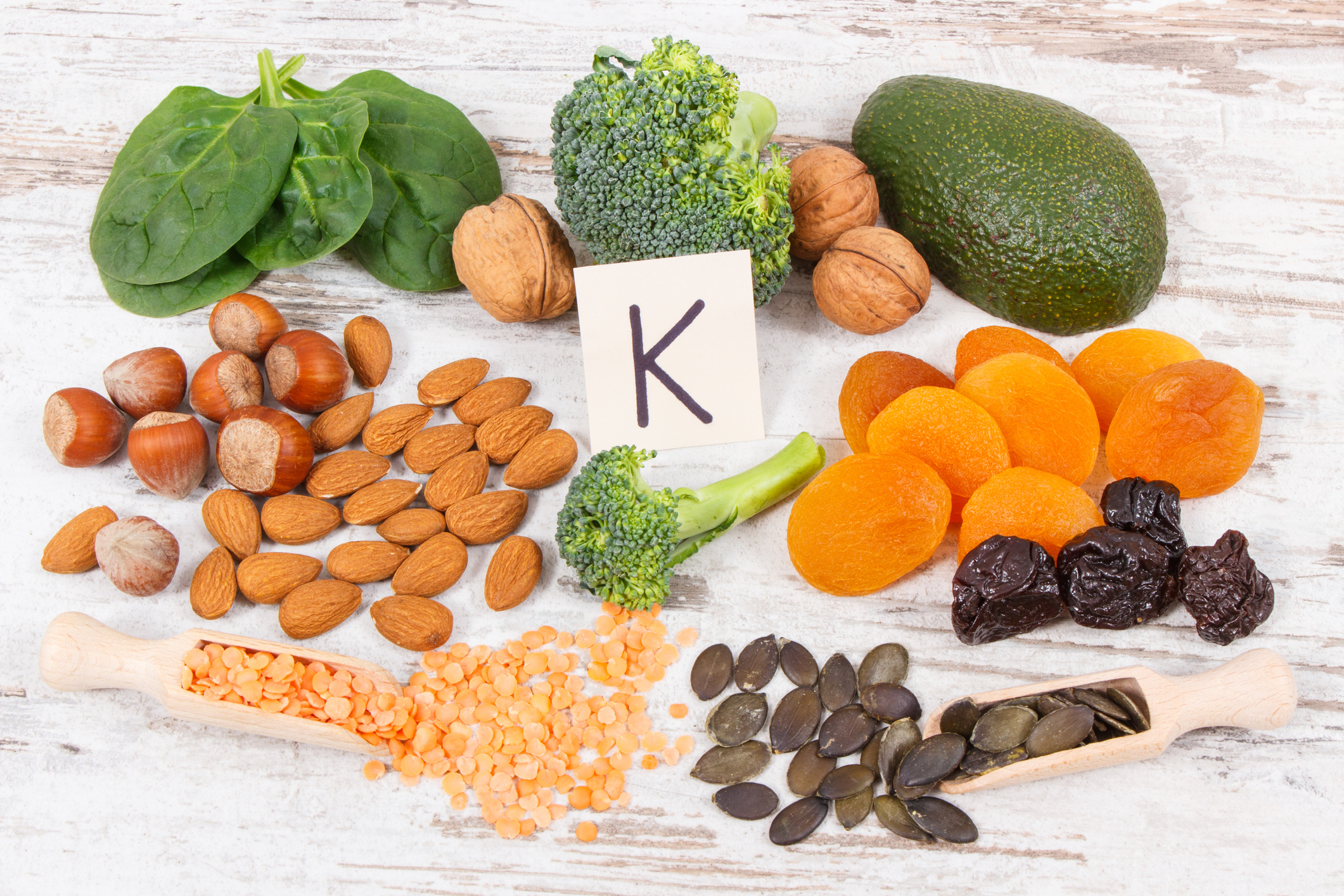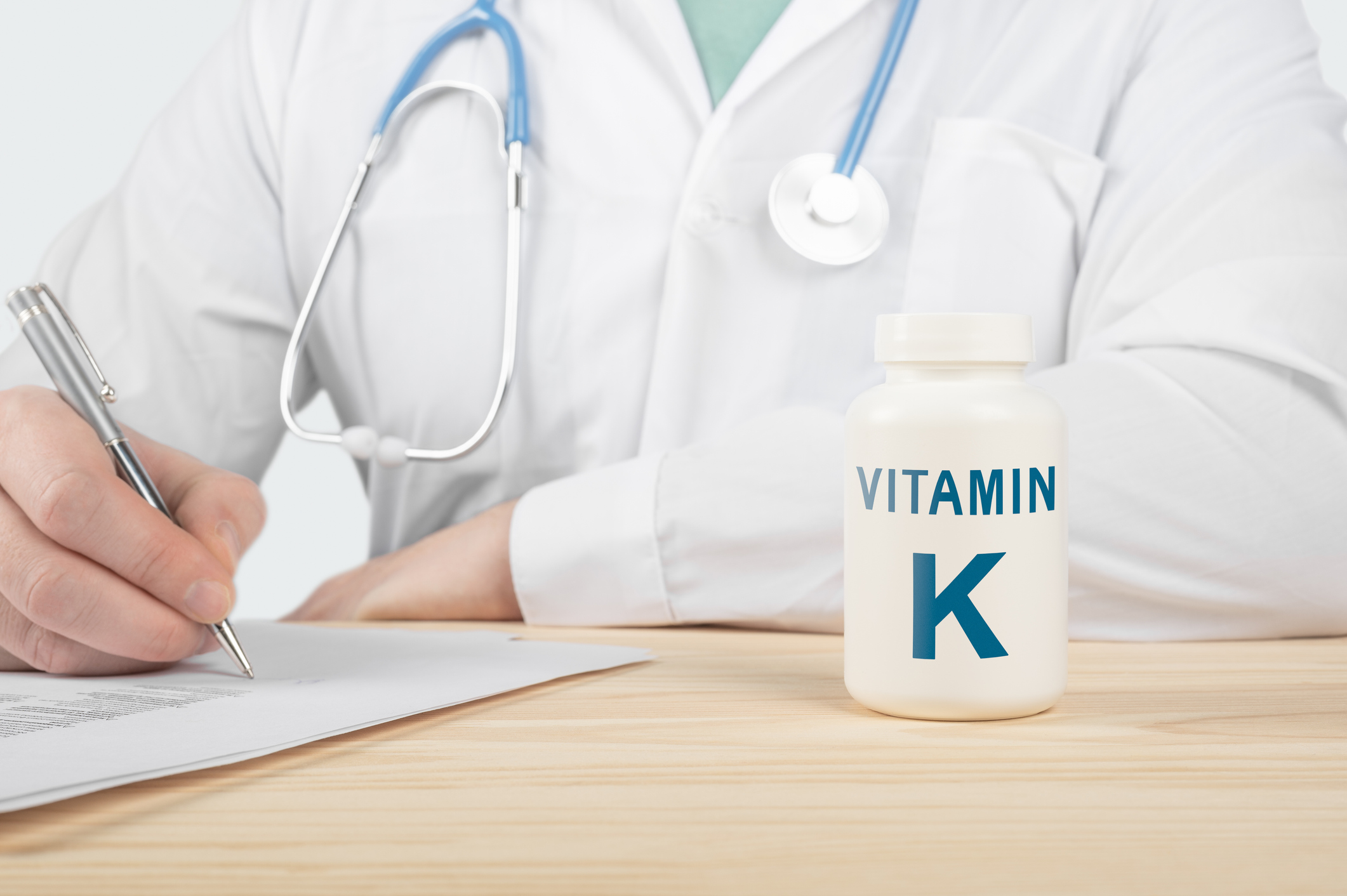- ncbi.nlm.nih.gov - Vitamin K: Double Bonds beyond Coagulation Insights into Differences between Vitamin K1 and K2 in Health and Disease; Maurice Halder, Ploingarm Petsophonsakul, Asim Cengiz Akbulut, Angelina Pavlic, Frode Bohan, Eric Anderson, Katarzyna Maresz, Rafael Kramann, and Leon Schurgers
- ncbi.nlm.nih.gov - Vitamin K Deficiency Bleeding in Infancy; Shunsuke Araki1 and Akira Shirahata
- pubmed.ncbi.nlm.nih.gov - Vitamin K - sources, physiological role, kinetics, deficiency, detection, therapeutic use, and toxicity; Přemysl Mladěnka, Kateřina Macáková, Lenka Kujovská Krčmová, Lenka Javorská, Kristýna Mrštná, Alejandro Carazo, Michele Protti, Fernando Remião, Lucie Nováková; OEMONOM researchers and collaborators
- pubmed.ncbi.nlm.nih.gov - Warfarin and vitamin K intake in the era of pharmacogenetics; Yael Lurie, Ronen Loebstein, Daniel Kurnik, Shlomo Almog, Hillel Halkin
- pubmed.ncbi.nlm.nih.gov - Warfarin: pharmacological profile and drug interactions with antidepressants; Juliana Souto Teles, Ellen Yukie Fukuda, David Feder
- ncbi.nlm.nih.gov - Pharmacogenetic-guided dosing of coumarin anticoagulants: algorithms for warfarin, acenocoumarol and phenprocoumon; Talitha I Verhoef, William K Redekop, Ann K Daly, Rianne M F van Schie, Anthonius de Boer and Anke-Hilse Maitland-van der Zee
Vitamin K and K2: What are its effects? Where in food is it found?

Vitamin K - what you may not have known about it? It belongs to the group of fat-soluble vitamins. But what is its role and effects in our body?
Article content
What is vitamin K and vitamin K2? What are its effects and why is it important for humans? What can cause deficiency and excess of vitamin K and what natural sources are available in food?
Vitamin K is said to be a key factor in blood clotting.
It was discovered as early as 1936, thanks to chickens. Those that were fed a low-fat diet suffered significantly higher bleeding rates. This prompted scientists to investigate its origins.
Vitamin K dissolves in fat. In this case, it was not being absorbed sufficiently. The result was a low clotting capacity.
Because vitamin K was associated with blood clotting when it was discovered, it got its name from the German word"Coagulation".
Vitamin K occurs naturally in two forms as:
- Vitamin K1 - also referred to as phylloquinone
- Vitamin K2 - also referred to as menaquinone
Vitamin K2 is further divided into two subtypes according to its chemical structure. With the so-called:
- short chain.
- long-chain
Vitamin K is also found in a third, synthetic form as vitamin K3. This form of the vitamin, however, has a number of adverse effects. These include blood haemolysis (breakdown of red blood cells). It also has toxic effects on the liver.
Some literature also mentions vitamin K4. This is a reduced form of vitamin K3.
Vitamins K1 and K2 and their functions in the human body
Vitamin K has several effects in our body. Although the effects of vitamin K1 and K2 differ significantly from each other. Therefore, we will look specifically at the effects of both.
One of the most well-known effects of vitamin K1 is its involvement in blood clotting. Vitamin K1 is involved in the activation of blood clotting factors.
These are:
- Coagulation factor II - also referred to as prothrombin
- Coagulation factors VII, IX and X
and anti-clotting proteins C and S.
Vitamin K is stored and concentrated primarily in the liver. The liver therefore serves as a reservoir for this vitamin. However, vitamin K is rapidly consumed in the production of clotting factors.
If it is not supplied in the form of food (or supplements), for example in the case of a restricted diet, its reserves are depleted within a few days.
Newborn infants are given vitamin K1 shortly after birth, either as a single injection or longer term by administration in droplet oral form. This treatment prevents potentially fatal bleeding from a deficiency of this vitamin.
This bleeding can occur during:
- The first 24 hours after birth - also referred to as early. This phenomenon is uncommon. It is usually caused by medications that mothers took during pregnancy. Such medications include:
- antiepileptic drugs - carbamazepine, phenytoin, barbiturates
- anti-tuberculosis drugs - isoniazid, rifampicin
- antibiotics - cephalosporins
- blood thinners - warfarin
However, without vitamin K1 prophylaxis, this fatal bleeding can also occur
- In the first week of a newborn's life - also referred to as classic.
But we also know
- Late - which can occur between the second week and the sixth month of the baby's age.
Low vitamin K1 levels in newborns are primarily due to low vitamin K1 passage through the placenta.
The fact that breast milk contains very low amounts of vitamin K1 and the immaturity of the newborn's digestive tract also contribute to this condition. This causes low absorption.
Recent studies have revealed that vitamin K1 also has antioxidant activity in our body. However, this activity is reduced by the action of warfarin.
Vitamin K also facilitates the production of ATP in the mitochondria. This helps when mitochondrial dysfunction occurs.
Vitamin K2 plays an important role in:
- cardiovascular disease
- in bone development and in the treatment of fractures
- chronic kidney disease
- and certain cancers
At the same time, it also has a significant effect on:
- liver disease
- immune reactions of our body
- neurological diseases
- but also obesity
Vitamin K2 and cardiovascular disease
The deposition of calcium ions in the blood vessels is a process that causes disease in our body's cardiovascular system.
According to current research, the protective mechanism of our body, which prevents the process of calcium deposition in the blood vessels, is provided by specific proteins. However, these proteins are dependent on vitamin K2. Therefore, vitamin K2 has a protective function in the formation of calcification of blood vessels.
Even after treatment with vitamin K2, an improvement in the elasticity of the blood vessels was observed, and there was also a regression of hardening of the arteries. In studies, patients were also treated with vitamin K1, but the effect was only demonstrated with vitamin K2.
There are still many ongoing studies in patients with various cardiovascular diseases. It is therefore likely that in the near future there will be other diagnoses for which vitamin K2 will be recommended.
Vitamin K2 and bone fractures
It is now well established that vitamin K2 improves bone quality. This also reduces the risk of fractures. These findings are supported by a number of studies with patients over 50 years of age.
Vitamin K2 is also important for bone development in children who are born with a vitamin K2 deficiency due to a genetic mutation. In this case, dietary supplements and medicines containing vitamin K2 should be given.
At the same time, further studies are still underway to clarify more precisely the role of vitamin K2 in the development, health and maintenance of bone function.
Vitamin K2 and diabetes mellitus
Studies have confirmed that long-term use of vitamin K2 supplements reduces the risk of diabetes.
The largest study involving 38 000 men and women aged 20 to 70 years showed that taking 10 µg of vitamin K2 per day reduced the risk of diabetes by 7%.
However, the exact mechanism by which vitamin K2 reduces this risk has not been clarified.
It may be related to the activation of osteocalcin by vitamin K2. Osteocalcin acts on the beta cells of the pancreas and thus affects insulin production.
Consequently, vitamin K2 is thought to have an effect on glucose metabolism.
Vitamin K2 and cancer
In several studies, vitamin K2 has been given as an adjunctive treatment to cancer patients. Studies have shown that vitamin K2 has prevented the growth and metastasis of several cancer cell lines.
In some cases, cancer development even subsided or patients went into complete remission.
Interestingly, the effect of vitamin K2 was not limited to one particular type of cancer. Its effect was observed in several types of the disease.
Vitamin K2 and liver disease
The role of vitamin K1 in the liver has already been described earlier in this article. But what about vitamin K2 and its effects on the liver? Vitamin K2 appears to have a regenerative effect on liver cells. It also affects the maturation and formation of liver cells from stem cells.
And because it can inhibit the development of cancer, it has also been found to be effective in liver cancer. Vitamin K2 was effective in both cases of this cancer. Whether it was alcoholic cirrhosis or non-alcoholic cirrhosis of the liver.
Similarly, its positive effects in liver cirrhosis alone are being considered.
Vitamin K2 and chronic kidney disease
Vitamin K deficiency occurs in chronic kidney disease. Research has shown that taking vitamin K2 improved renal artery function.
At the same time, this treatment prevented further calcium deposition (called calcification) in the renal arteries. Both of these processes contribute to improved kidney function.
Vitamin K2 treatment has also been shown to improve glomerular filtration rate.
Vitamin K2 and the immune system
Vitamin K2 reduced the number of activated cells of the immune system compared to vitamin K1. Therefore, vitamin K2 has been attributed an immunosuppressive effect. This effect could be used, for example, in atopic dermatitis.
However, this requires further investigation.
Vitamin K2 and neurological diseases
One study describes reduced levels of vitamin K2 in patients with multiple sclerosis compared to healthy volunteers.
It also described the function of vitamin K2 in neuronal differentiation and its effect on brain cell protection.
Vitamin K2 levels were also correlated with neurological spasms and optic nerve lesions. Thus, these studies suggest a very important role of vitamin K2 not only in neurological development but also in its diseases.
Vitamin K2 and obesity
In studies conducted on humans, improvements in body weight have been shown when taking dietary supplements with vitamin K2. Improvements in other parameters such as:
- waist circumference - calculation of waist to hip ratio
- body build
- amount of visceral fat
- progression of diabetes
Overall, it can be said that vitamin K2 has a positive effect on glucose and fat metabolism. However, further research is also needed in this regard.
Vitamin K1 and K2 and their occurrence in food
Vitamin K1
Vitamin K1 is mainly found in green leafy vegetables and green parts of plants. It is less abundant in green fruits.
Vitamin K2 is produced by bacteria. It is therefore mainly found in foods that use bacteria in their production - fermented products.
The main sources of vitamin K1 include:
- Vegetables, e.g.:
- spinach - 96.7 µg/100 g
- Sauerkraut - 22,4 µg/100 g
- cabbage - 75,3 µg/100 g
- Fruits, which include:
- avocado - 15,7 to 27 µg/100 g
- kiwifruit - 33,9 to 50,3 µg/100 g
- green and red grapes - 13,8 to 18,1 µg/100 g
However, it also occurs in:
- beetroot - 568 µg/100 g
- kale - 75,3 µg/100 g
- broccoli - 146,7 µg/100 g
- roasted soya beans - 57,3 µg/100 g
- or carrot juice - 25.5 µg/100 g
In addition to the above fruits, vitamin K1 can be obtained from:
- blueberries - 14.7 to 27.2 µg/100 g
- blackberries - 14.7 to 25.1 µg/100 g
- dried figs - 11.4 to 20.0 µg/100 g
- but also prunes - 51,1 to 68,1 µg/100 g
Among the representatives among nuts are its source:
- pine nuts - 33.4 to 73.7 µg/100 g
- cashew nuts - 19.4 to 64.3 µg/100 g
- and pistachios - 10.1 to 15.1 µg/100 g
Other fruits and nuts contain very small amounts of vitamin K1.

The vitamin K content of meat and fish depends not only on the species of animal but also on the origin of the meat.
The most important sources of vitamin K1 in meat are:
- deer loin - 2,4 µg/100 g
- beef liver - 2,3 µg/100 g
Of the fish sources, the following species are the richest in vitamin K1:
- mackerel - 0.5 µg/100 g
- or even eel - 1.3 µg/100 g
Vitamin K1 is a fat-soluble vitamin, so its absorption from food intake increases with a diet rich in fat.
Vitamin K is absorbed in the small intestine and then transported by the blood to the liver.
Vitamin K1 is taken up by the liver and is rapidly lost from the bloodstream. The liver synthesizes clotting factors using vitamin K1.
In contrast, vitamin K2 remains in the bloodstream longer and is taken up by bone tissue and vascular tissue.
Vitamin K2
As far as vitamin K2 is concerned, fermented products are the main source of vitamin K2, whether it is meat or dairy products.
The highest amount of vitamin K2 (985 ng/g) is found in natto, a Japanese food produced by fermenting soybeans with bacteria.
In addition to fermented products, vitamin K2 is also found in:
- chicken meat - 10.1 µg/100 g
- egg yolks
- hard cheeses
- sauerkraut
- beef - 1.9 µg/100 g
- but also in salmon meat
In addition to the foods listed above, the following foods are also high in vitamin K2:
- beef liver - 11.2 µg/100 g
- and pork liver - 1.8 µg/100 g
Fish is the richest in vitamin K2:
- similar to vitamin K1, eel - 63.1 µg/100 g
- plaice - 5.3 µg/100 g
- salmon - 0.6 µg/100 g
However, vitamin K2 is also produced by our gut bacteria in the digestive tract.
Foods containing both vitamin K1 and vitamin K2
Sauerkraut is the most ideal source of both forms of vitamin K1 and K2.
- K1: 22.4 µg/100 g
- K2: 5,5 µg/100 g
As far as the vitamin K content of cheese is concerned, the amount depends on various production factors, one of which is the ageing period.
This is mainly due to the length of the fermentation process, but also to the nature of the bacteria used.
However, it should be borne in mind that neither cheese can be considered as a stand-alone source of vitamin K2.
Of the European cheeses, the highest levels of vitamin K1 were found in the varieties:
- Roquefort - 6,56 µg/100g
- Pecorino - 5,56 µg/100g
- Brie - 4,55 µg/100g
- but also other varieties
K2 again contained mainly:
- Munster - 80.1 µg/100 g
- Camembert - 68.1 µg/100 g
- Gamaloste - 54.2 µg/100 g
- but also Ementhal and Roquefort
Vitamin K and its daily intake
The daily intake of vitamin K1 is not precisely defined.
For men it varies between 65 µg/day and 120 µg/day.
For women it varies between 55 µg/day and 90 µg/day.
Research shows that the daily intake of vitamin K1 from the diet is quite sufficient to cover the recommended daily allowance. In many cases, this intake is higher than the recommended daily allowance.
Vitamin K1 deficiency has not yet been observed in healthy adults.
In the case of vitamin K2, however, dietary intake is insufficient. Only about 25 % of the recommended daily allowance is obtained from food.
For this reason, it is recommended to increase vitamin K2 intake through dietary supplements and medication.
However, there is currently no precise reference daily intake of vitamin K2.
As for side effects, these have not been observed with dietary intake. Although there may be concerns that excessive intake will lead to excessive blood clotting, the opposite is true.
Extremely high doses of vitamin K have caused hypoprothrombinemia (reduced ability to form blood clots) in humans. In animals, high doses have led to bleeding and subsequent anaemia.
In general, side effects may include minor gastrointestinal upset. Skin rashes have been reported with vitamin K2 supplements. These disappeared after treatment.
However, it should be borne in mind that the synthetic form of vitamin K - vitamin K3 - has many serious side effects. These are mainly due to its chemical structure.
Vitamin K and blood thinners
Warfarin, a blood thinner, belongs to the group of so-called coumarin oral anticoagulants.
Warfarin was originally used as a rat poison. Rats bled to death after ingesting it.
Warfarin acts as a vitamin K antagonist.
By inhibiting the conversion of vitamin K, it interferes with the production of clotting factors. This action therefore results in reduced production of coagulation factors. The end result is its anticoagulant effect.
Warfarin, however, has no effect on the action of the coagulation factors that are already formed in our bloodstream (factors II, VII, IX and X). Therefore, its effect is only fully apparent once the existing clotting factors have been depleted.
The effect of a diet rich in vitamin K on the effect of warfarin has long been known.
In particular, a diet high in green vegetables, various reducing diets and the use of vitamin K supplements have contributed to the failure of anticoagulant therapy.
The amount of vitamin K ingested ranged from 25 to 6 000 µg/day.
Another study confirmed that patients receiving more than 250 µg/day of vitamin K had reduced sensitivity to warfarin treatment. Taking a single 250 µg tablet did not affect the effect of warfarin in patients who were already stable on this treatment.
However, treatment lasting longer than one week already affected the effect of warfarin. Therefore, it was necessary to increase the dose of warfarin.
However, care should also be taken with multivitamin preparations, which in many cases also contain vitamin K. Patients taking warfarin should therefore be careful with these. Whether you are starting, taking or have recently stopped taking multivitamins.
The attending physician should also be made aware that you are starting or taking anticoagulant therapy.

However, many patients taking warfarin have very low levels of vitamin K. This is mainly due to dietary restrictions.
However, studies have confirmed that if there are low concentrations of vitamin K in our bodies, the intake of even low doses of vitamin K can have a big effect on the effect of warfarin.
Therefore, low vitamin K diets are slowly being abandoned in patients on anticoagulants. The ideal is to follow a steady dietary regime.
However, in recent years, the genetic make-up of the individual has also been investigated. It turns out that this also has an influence on the anticoagulant effect of vitamin K. Simply put, if two patients take the same amount of warfarin and vitamin K at the same time, their body's response may be different.
In conclusion, we would like to recall that vitamin K has been known for more than 80 years, mainly due to its important function in blood clotting.
Many of the effects of the different forms of vitamin K have not yet been fully elucidated. Therefore, it certainly still has great potential in terms of different types of diseases and their treatment.
Interesting resources










